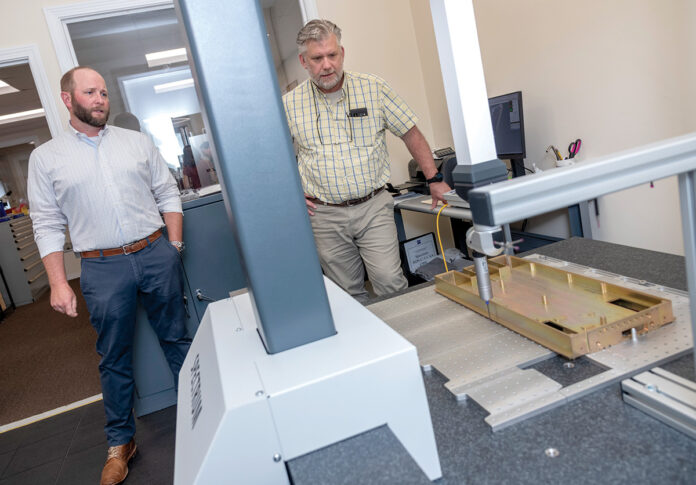Don Boyle picks up a palm-sized model of the Apollo 11 lunar lander from Jade Manufacturing Co.’s conference table and smiles as he looks at it.
“We like to think we had a hand in [building] this,” said Boyle, Jade’s president.
[caption id="attachment_416256" align="alignright" width="300"]
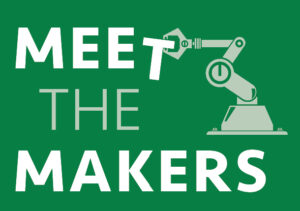 (Editor’s note: This is the first installment in a monthly series highlighting some of the region’s unsung manufacturers that make products essential to the economy and, in many cases, our way of life.)
(Editor’s note: This is the first installment in a monthly series highlighting some of the region’s unsung manufacturers that make products essential to the economy and, in many cases, our way of life.)[/caption]
But he’s not quite sure if that’s true, whether the Warwick manufacturer helped put man on the moon by making or assembling parts for the historic 1969 space mission. That’s the nature of working with secretive defense contractors and aerospace companies: Sometimes Jade builds complex parts without knowing for sure how they’ll be used.
“They don’t really want us to know,” Boyle said. “Even if I knew for sure, I couldn’t tell you.”
Nevertheless, the model of the lunar lander serves as a reminder that every gasket, every metal rod, every screw that leaves Jade’s facility could have a lot riding on it.
The company, which specializes in precision machining and industrial assembly, flies largely under the radar, operating out of an unassuming, one-story building tucked away on a side street in the Apponaug section of the city. Even the metal rod, tube and gasket assemblies they produce don’t look like much on their own.
But Jade’s handiwork has played crucial roles in the vaunted Patriot surface-to-air defense system, Tomahawk cruise missile and in the most powerful non-nuclear weapon explosive device deployed by the U.S, dubbed the “mother of all bombs.”
That means the stakes are high. Even the smallest mistake doesn’t just risk an unhappy customer; it could jeopardize a military operation or outer-space exploration.
That’s never happened in Jade’s 77-year history. But the worry still niggles in the back of Boyle’s mind, keeping him vigilant, striving to maintain the precision that has earned Jade recognition from Raytheon Technologies Corp., the U.S. Small Business Administration and certifications by various industry groups.
More than a framed certificate, it’s Jade’s reputation that Boyle says is what sets his family business apart. Fast, reliable and forever searching for the next opportunity – be it a new machine, product or accreditation.
“We’re willing to try anything once,” said Chris Burch, company vice president who is slated to take over the business from his father-in-law in 2032, following a 10-year succession plan. “We’re not scared by components or parts that other suppliers might have trepidations about.”
Take tube bending. Seen as a “black art” by some manufacturers because of how difficult it is to perform correctly, Jade embraced the daunting task of bending a hollow tube at a 90-degree angle – without kinking it – to make parts becoming increasingly popular thanks to a rise in electric vehicles.
The secret to success? Like most things at Jade, Boyle won’t reveal much, although he notes that the company hired someone with expertise in tube bending to get it right.
[caption id="attachment_416257" align="aligncenter" width="1024"]
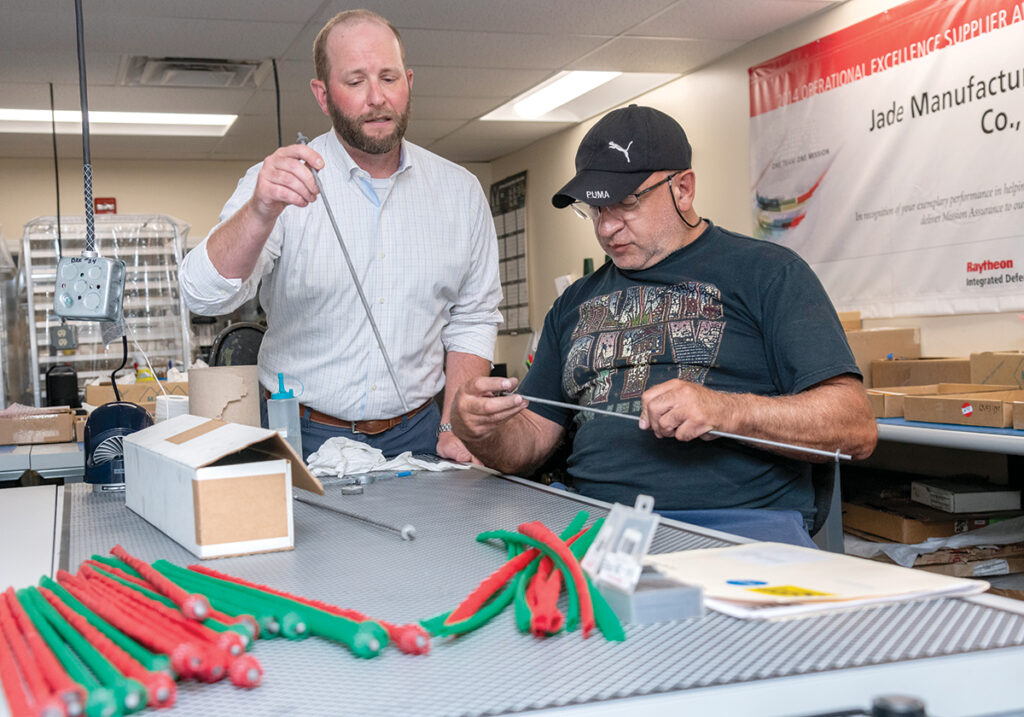
ATTENTION TO DETAIL: Vice President Chris Burch, left, and assembler Donald Campbell look at some parts for the Patriot surface-to-air defense system at Jade Manufacturing Co. in Warwick, a family-owned manufacturer that specializes in parts for the defense and aerospace industries.
PBN PHOTO/MICHAEL SALERNO[/caption]
CHANGE OF PLANS
Military and aerospace remain the backbone of the company, primarily because Raytheon – the aerospace and defense conglomerate that has facilities in Portsmouth – comprises about 80% of its business.
But in recent years, Jade has ventured into other emerging markets such as offshore wind, aided by partnerships with manufacturing groups such as Polaris MEP and the Southeastern New England Defense Industry Alliance. In 2019, Jade set out on a yearlong revamp of its quality management system to earn the AS9100 certification for companies that consistently meet exacting aerospace standards.
Burch credits his father-in-law for building a thriving company. “Don really took us in a different direction,” Burch said.
Started in 1945 by Boyle’s father, Arthur Boyle, Jade Manufacturing began as a machine shop specializing in military and defense pieces.
Raytheon had just started developing radar technology at the tail end of World War II, and Arthur Boyle saw an opening to combine his expertise honed from prior jobs as a manufacturing machinist and at the Naval Torpedo Station in Newport.
Raytheon hired the fledgling company, and nearly eight decades later, it is still Jade’s biggest – and longest-running – client.
Don Boyle didn’t grow up dreaming of taking over the business. He begrudgingly painted walls and cleaned parts as a teenager, wishing he could spend his summers with his friends on Cape Cod instead. He studied business – first at Georgetown University and later in a master’s program at Providence College – but not with intentions of returning to Jade.
“My dad wanted me to go to law school,” he said.
As he got older, Boyle realized the opportunity to learn the ins and outs of his father’s company was going to pass him by. “I always had a lot of admiration for my father, and I thought, this is my chance to go back,” Boyle said.
So Boyle returned.
He spent his first few months at Jade combing through the file cabinets that contained the details of every job the company ever worked on – 25 years’ worth of work at that point. He figured if he understood the company’s past, he could determine its future. For that future, he had many ideas, but his father brushed them off.
“I never had a better idea than him for years,” Boyle said. “He used to shake his head before I finished my sentence. That used to really aggravate me.”
Even after Boyle took over the family company in 1970, his father still wanted the final stamp of approval. Boyle recalls bringing paperwork to the nursing home where his father lived so he could review it.
Eventually, his dad relaxed. And, as Boyle’s autonomy as president grew, so did the success.
[caption id="attachment_416258" align="aligncenter" width="1024"]
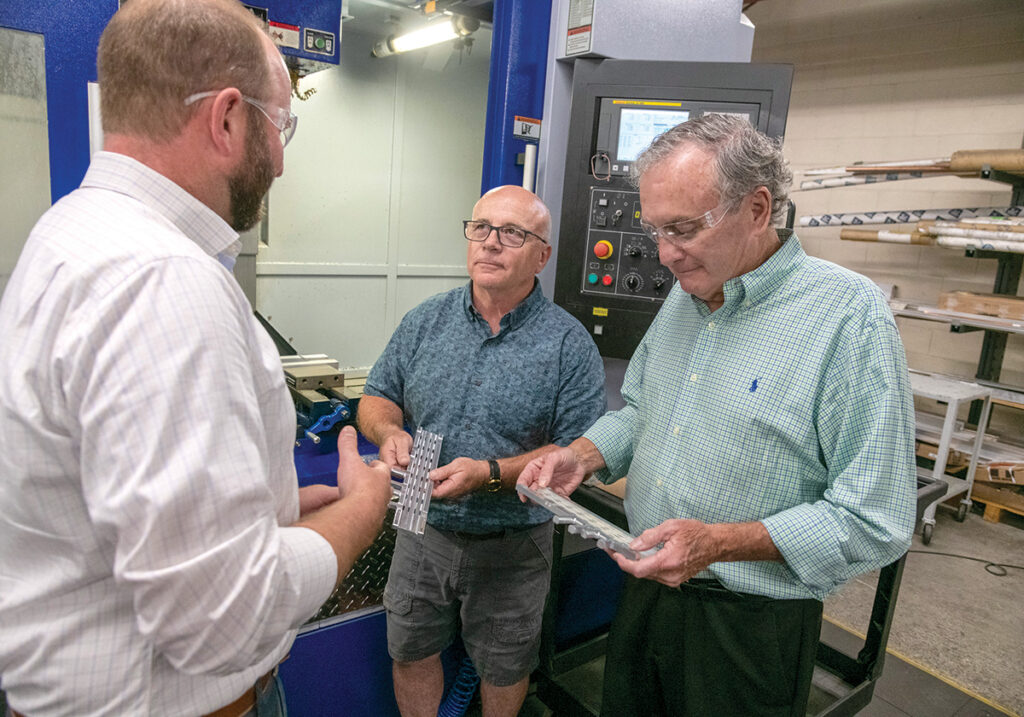
PRODUCT REVIEW: Jade Manufacturing Co. Vice President Chris Burch, left, Director of Manufacturing Steve Gruner, center, and President Don Boyle examine some trays they produced on their milling machine.
PBN PHOTO/MICHAEL SALERNO[/caption]
GROWTH TRACK
Boyle carved out a niche for Jade as a kind of project manager on other manufacturers’ behalf, what’s known in the industry as an integrated company. Jade gathers, inspects and assembles the individual screws, gaskets and tubes from different makers and certifies them against federal standards before shipping them off to big-name defense and aerospace clients.
This allowed Jade to grow without having to bankroll a 200-person machine shop or rooms full of manufacturing equipment, Burch says.
Indeed, the company profits have climbed 5% for each of the past five years – Boyle declined to share their actual revenue – but the employee headcount has stayed at a “lean” 12 to 20 workers, all of whom are cross-trained in various aspects of the inspection, measurement, assembly and shipping processes.
“Our specialty is using everybody else’s expertise,” Burch said. “Rhode Island has this robust manufacturing landscape, so why wouldn’t we use that?”
The company still makes some parts in-house, using a handful of vertical milling and computer numerical control machines, but only “low production” jobs – no more than a couple hundred of any given part. Usually, they’re new or experimental prototypes, Burch says.
Using fewer traditional machinery pieces also leaves room in the company budget for other capital expenditures. Among the most recent: a coordinate measuring machine. Housed in its own room, the $125,000 machine uses computer-controlled probes to verify three-dimensional measurements, with precision down to the millimeter to meet military certification standards.
Even after two years, it hasn’t lost its novelty to employee Mark Harlow, who works in quality control. Harlow marvels as the machine springs to life, whirring softly as its robotic arm slowly scans an unidentified part to take its measurements.
It’s work that used to take Harlow several days to complete. With this machine? “It takes 15 minutes,” Harlow said.
Just as important as automation are the people overseeing it, Jade’s executives say. The goal is not to replace employees with robots but to use technology to help workers do their jobs better and faster.
Steve Gruner, Jade’s director of manufacturing, likens the relationship between workers and machines to puppeteers and their marionettes.
“We pull the strings, but if you improperly pull the string, you’re going to get a tangled mess,” Gruner said.
THE CHALLENGES
[caption id="attachment_416259" align="alignright" width="258"]
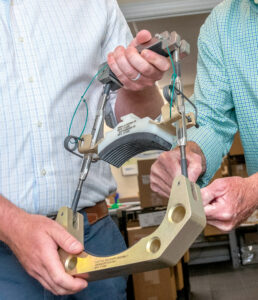
An assembly produced at Jade that will be used by one of the company’s defense and aerospace clients.
PBN PHOTO/MICHAEL SALERNO[/caption]
Finding skilled and reliable workers to pull those strings is a chronic battle. Many employees of today want to sit at a computer, not operate machinery.
Groups such as Polaris MEP, SENEDIA and the Rhode Island Manufacturers Association have tried to rebrand the industry, sometimes with Jade’s help.
Despite its small size, Jade punches above its weight in helping shape the state’s manufacturing workforce, said Lindsey Brickle, Polaris’ senior workforce manager. Not only has Jade hired participants who graduate from Polaris’ training programs, but it has also taken those trainees in for hands-on experience, even if they end up working elsewhere.
“They may be a small business, but they have a really big impact [on the worker pipeline],” Brickle said.
Training efforts aside, Gruner still thinks there’s an image problem.
“People think they’re going to come home soaked in oil and filthy dirty,” Gruner said. “That’s not what we do.”
Even Burch, who started working for Jade 15 years ago, was surprised to find the dark and dirty world of machinery was not actually dark or dirty at all. A regional manager for a commercial cleaning company who had studied pre-law in college, he had little inkling of what he was getting into when his then-girlfriend persuaded her dad to give him a job.
“To say I was nervous would have been an understatement,” Burch said. “I didn’t want to mess up in front of my girlfriend’s father, and especially when it comes to operating a business.”
Though Burch says it took a little time for him and Boyle to “warm up to each other,” their partnership is evident as they walk through the shop with a visitor, taking turns answering questions, periodically pausing to give a hearty clap on the back to a passing worker.
In a small and fast-paced environment, conflict does arise. But it doesn’t leave the workplace.
“It wouldn’t be unheard of for us to have a disagreement at work and then have dinner at one of our houses later that day,” Burch said.
Family is sacrosanct, Boyle says. And that family includes the people who work with them.
While Jade is not immune to the workforce shortages sweeping the country, it’s fared better than most. Many among its workers have been there for decades; nobody has quit during the COVID-19 pandemic, according to Burch.
In addition to competitive pay and benefits, the company has added extra perks: buying the staff lunch on Fridays and holding a weekly “Wheel of Fortune” in which the spinning wheel chooses a person to get a Friday off.
But the manufacturing partners – Rhode Island companies such as Goodwin Bradley Pattern Co., Fasano Corp. and Brada Manufacturing Inc. – it buys parts from have not been so fortunate. Some just can’t find the staff to keep their assembly lines running, or are still waiting for parts that were supposed to arrive weeks ago. Others have shuttered altogether.
That has forced Jade to sometimes compromise its reputation for reliability and timeliness with its clients, and lower expectations to account for a supplier’s staffing shortages and supply chain snafus beyond its control.
It’s not an easy call to make. But open communication with clients is at the heart of the company’s mission, whether it pertains to a delayed part from another supplier or an experimental assembly that didn’t work as anticipated.
“We never knowingly ship anything that’s not correct,” Boyle said. “Even if it means having to start over.”
Burch agrees.
“Sometimes you have to tuck your tail between your legs and go back to them,” he said. “You’re always one job away from finding yourself on the outs.”
